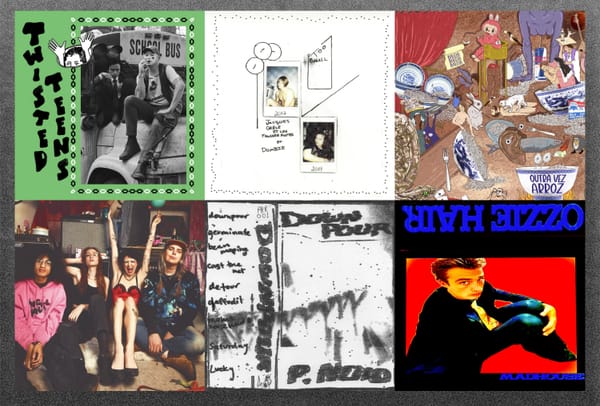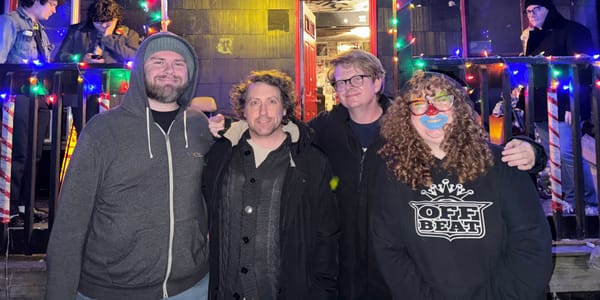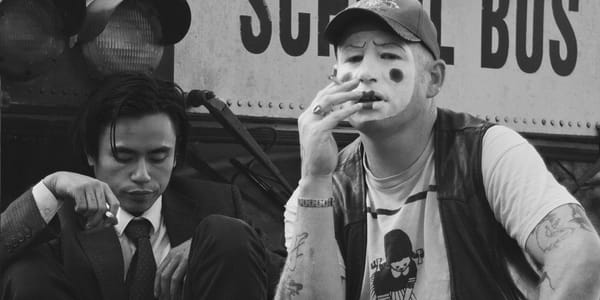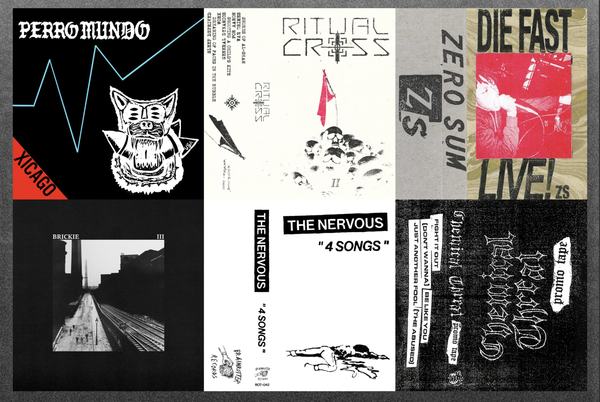g.i. jinx emerge from montreal’s “cesspool of artists”
Around the release of their new album Mind Freak, the group discusses the creatively inspiring nature of Montreal’s punk scene.
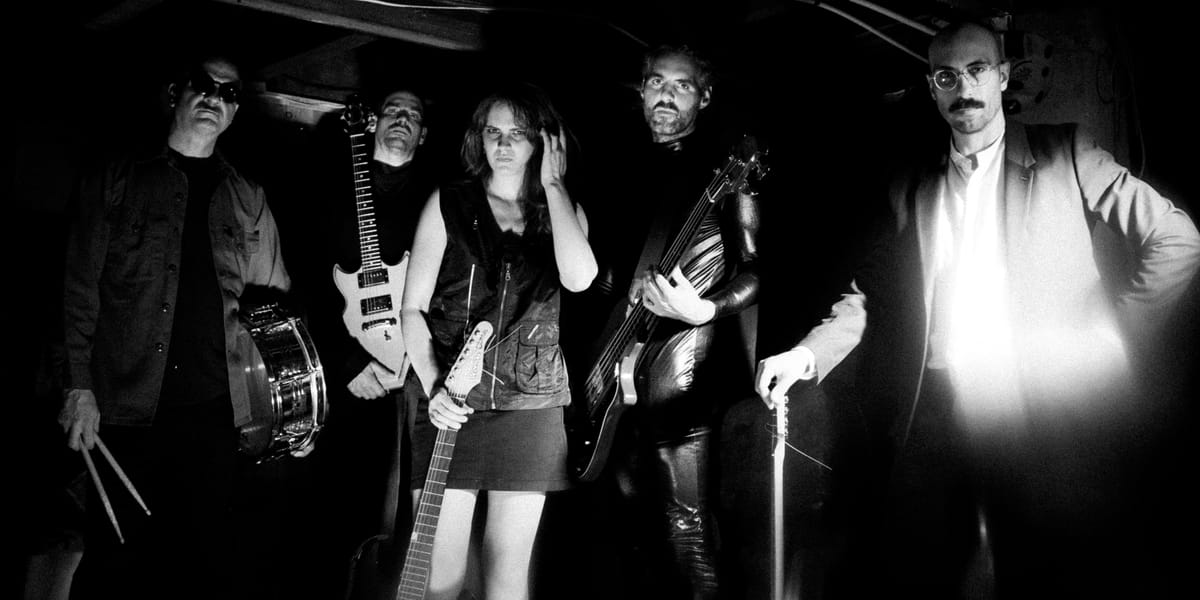
I’d just watched the video for G.I. Jinx’s teaser single “Sewer Prince.” It’s a sort of low-tech, white-collar nightmare set in downtown Montreal that mixes slapstick with body horror. It starts out pretty normal with the band members decked out in office attire, briefcases, and cellphones but as the video develops, they get increasingly deformed and ruined. By the end the band’s sprawled out in the depths of the Metro disassociating, spewing, and otherwise bonking out before the whole thing devolves into a jam.
So I was all the more stoked to connect on a video call with Anna, Felix, and Steve from the band. We made small talk about the Fall and mutual friends/ex-bandmates before getting into their album Mind Freak (out now on Celluloid Lunch and the recently resurrected Psychic Handshake label). G.I. Jinx bring a triple guitar psych and sludge assault with some gnarly garage overtones. It’s punishingly in the red and it bears traces of their shared mid-’00s Montreal noise roots.
How did this band come together?
Steve Peavy: Félix and I reached out to Carlo Della Motta in 2019... actually there were a bunch of different people in the band back then too. When COVID hit things just fell apart, then we started it back up, was it in 2021? Around then we reached out to Michael Farsky for bass and we started playing the songs in a couple of practice spaces, one in Saint-Henri at the Fattal Lofts, and then the Crumper in Outremont. We cemented eight songs before Anna joined the band in 2023. When we were recording the album I think, Anna, you would have been in the band for six months at that point?
Anna Arrobas: Yeah, basically Élie, who co-wrote two of the songs... I was in a band with him called Security before and I was always a fan of No Negative—Steve, Carlo and Félix 's previous project, I knew this band had existed for a long time and I thought if they ever needed a singer I wanted to be the singer.
I can hear G.I. Jinx’s resemblance to No Negative for sure.
Félix Morel: Just to add a bit of context, me and Steve jammed as a duo for a while and then we had to have Carlo in the band because we had fun playing with him in No Negative. The other musicians at that time were bassist Élie Bérard-Faubert, Stuart Mitchell on guitar, and Marie Davidson on vocals. The pandemic put a stop to that early lineup. When it was safe enough to regroup and play, all three had to focus on other projects. We were back to square one and needed a bassist and a singer. We were playing this aggressive, macho music, so we wanted someone to balance it out and not be super cliché and stuff. Elie suggested Anna and I was like, “duh of course it will be a perfect match, why didn’t we think of her sooner!” Most of the music was written already when Anna joined.
Steve: Yeah, we had some demos at that point. I think we were just like finishing up one or two songs.
It’s funny because on first listen, my impression was this is a band where the band members are into different stuff.
Anna: I think it’s pretty diverse.
Steve: I would agree.
Félix: We wanted something that was not easy to pinpoint. We’re not trying to be experimental or anything, but we’re trying to not sound too specific.
Yeah, not a genre exercise. For example, I don't hear a lot of metal.
Steve: Yeah, some of us are into metal but the degree varies between members. I’m really into how it wasn’t so defined in the beginning. And we've had talks about how we are influenced by Black Sabbath, like the genius of Bill Ward, and of course the riffs.
Félix: I don't think metal is a big influence, but it’s there. We’re more influenced by punk or hardcore bands who were influenced by it than proper metal, per se.
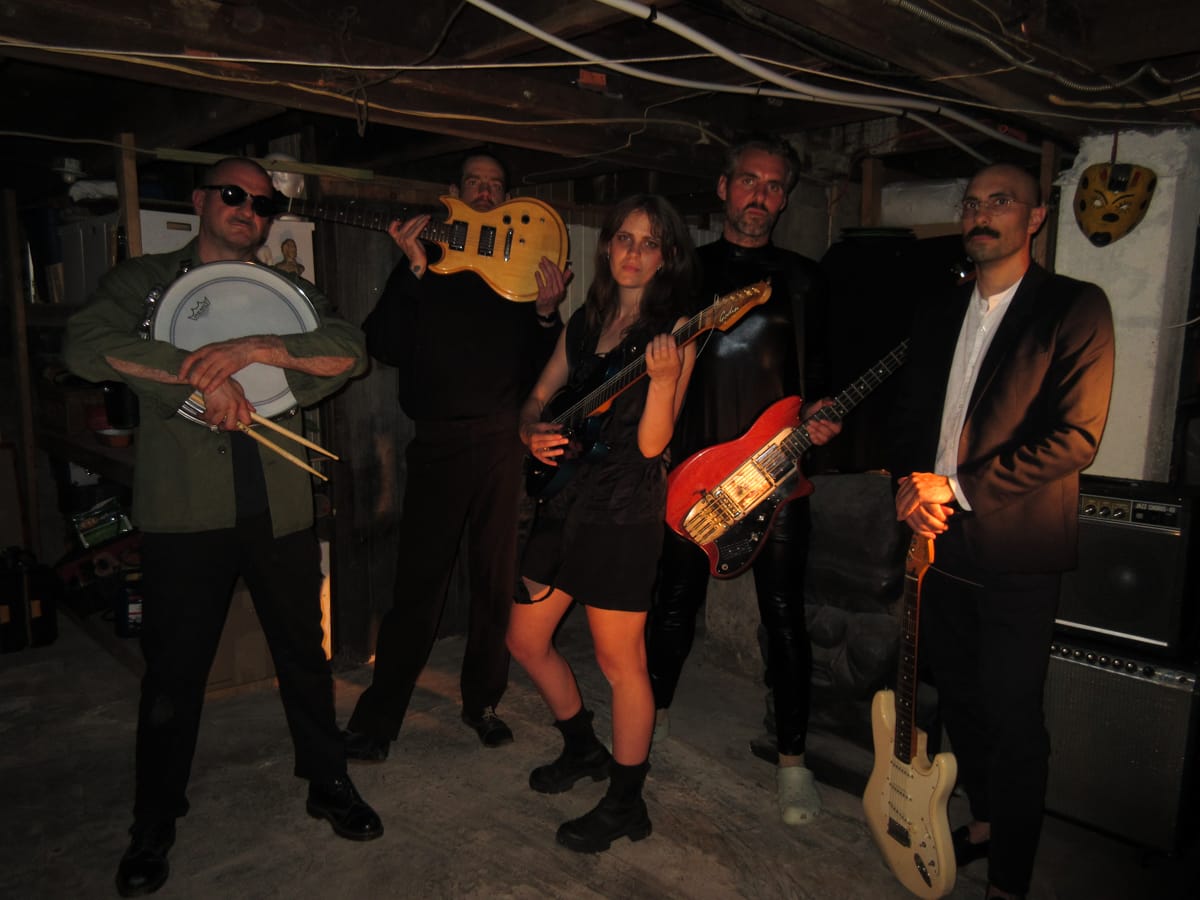
Was starting the record with the sound of rain a reference to Black Sabbath?
Steve: Totally. Carlo didn’t want that at all.
Félix: I kind of pushed for that.
Anna: It was four against one.
Félix: Yeah, because in that opening song “Sewer Prince,” there's a little funky break we call the Sabbath part and we were toying with the idea of putting in a cowbell like in “The Wizard.” There’s just one cowbell hit in the song and it sounds like a mistake but they kept it in because it’s too perfect. I couldn't achieve that one cowbell hit perfection so we skipped that idea.
Montreal feels to me like it has a real identity as a scene compared with Toronto. Maybe it’s just because I live here, but do you feel being based in this place is an important part of your band?
Steve: I don’t think we would exist in any other city. Not to say that we’re special but…
Anna: Yeah, it’s definitely a great city to live in as an artist. I feel like I’m constantly surrounded by tons of different musicians. I guess every couple of years a venue shuts down but a bunch of new ones have popped up and people are opening up their jam spaces. The Crumper, where we used to jam, is now a music venue where we’re going to have our release show. It’s just a really easy city to live in and be a musician. You could be walking down the street and there will be shows all summer long at the underpass and the cops don’t give a shit. It’s kind of crazy. It’s like a cesspool of artists.
I was talking about the difference between the two cities to a friend in a band who said, in Toronto we have to kind of force this music and creativity to happen, but in Montreal, it happens organically.
Félix: It's because of the French people. I’m joking.
Steve: Maybe cheaper rents allowed for time to explore creativity and the communal escapism was less informed by the necessity of working 40 hours a week? But rents aren't that cheap anymore. A watershed moment for me was Cool Fest '07. It was this big community building thing that made me feel connected to the other weirdos making music in the city. It was through the surrounding scenes of noise and proto weird punk where we all played shows together but in different projects. Carlo ran a label called Pasalymany Tapes around this time, and put out a lot of bands that participated in those scenes.
Music that was more far out than, say, the no wave revival of around that time?
Félix: Maybe. It was a bit related sometimes, like my free rock/psych band Panopticon Eyelids, we were in the same practice space as AIDS Wolf, which I guess is the big no wave revival band from Montreal. We played many shows with them. Carlo put out their first tape on his label. We used to call it the noise scene but it was pretty diverse. A five band bill would have a great range of styles and sounds. Michael was even in a karaoke style party band called Homosexual Cops that put on crazy live shows where people would get naked.
Anna, you mentioned the outdoor concerts, I was wondering if that's a recent development post-COVID or was that always a thing in Montreal?
Anna: How long ago did those shows at the underpass start happening?
Steve: I think during COVID was when it started to happen more.
Félix: There used to be some sponsored block parties in the past, but they were more like hip hop or DJ type events
Anna: Now that I’m thinking about it, that whole area in the Mile-End they would do Marché Des Possibles, which is part of Pop Montreal and Suoni fest, had this area called entrepôt 77 for outdoor shows, but there’s a lot of DIY stuff too.
Félix: During the pandemic I saw two hardcore punk shows in Hochelaga in a place we call the Wasteland. It’s near the abandoned train tracks. They’d just bring a generator, plug in and play. It was super fun.
How did you connect with Joe from Celluloid Lunch?
Félix: I am trying to remember how we met. I guess it was from buying the records and fanzines he put out.
Steve: He was bugging you, asking, “What’s the status of the band?”
Félix: Yeah, right! He was a fan of No Negative. Also, we both work in the Constellation Records/Hotel2Tango building and when we bumped into each other he kept inquiring about that new project I had. He even offered us an opening spot for the Puppet Wipes show he was promoting, but we didn’t have a band name yet. It took us so long to find one. Eventually he heard recordings and was down to release an album.
And it’s a split release?
Félix: Yeah, our friend Graeme Langdon with his old label Psychic Handshake Recordings—he was super involved in the mid-2000s Montreal weird punk era, if you know what I mean? They were putting out records including the first No Negative LP, booking tons of shows as the Pirates of the Lachine Canal, and just helping out a lot in the indie and punk scene in Montreal. Graeme eventually moved to Kingston for a teaching job but recently came back to Montreal wanting to relaunch the label. He told Carlo about it and the collaboration between the two labels just made sense. They both mutually respect each other’s work and have the same sort of aesthetics.
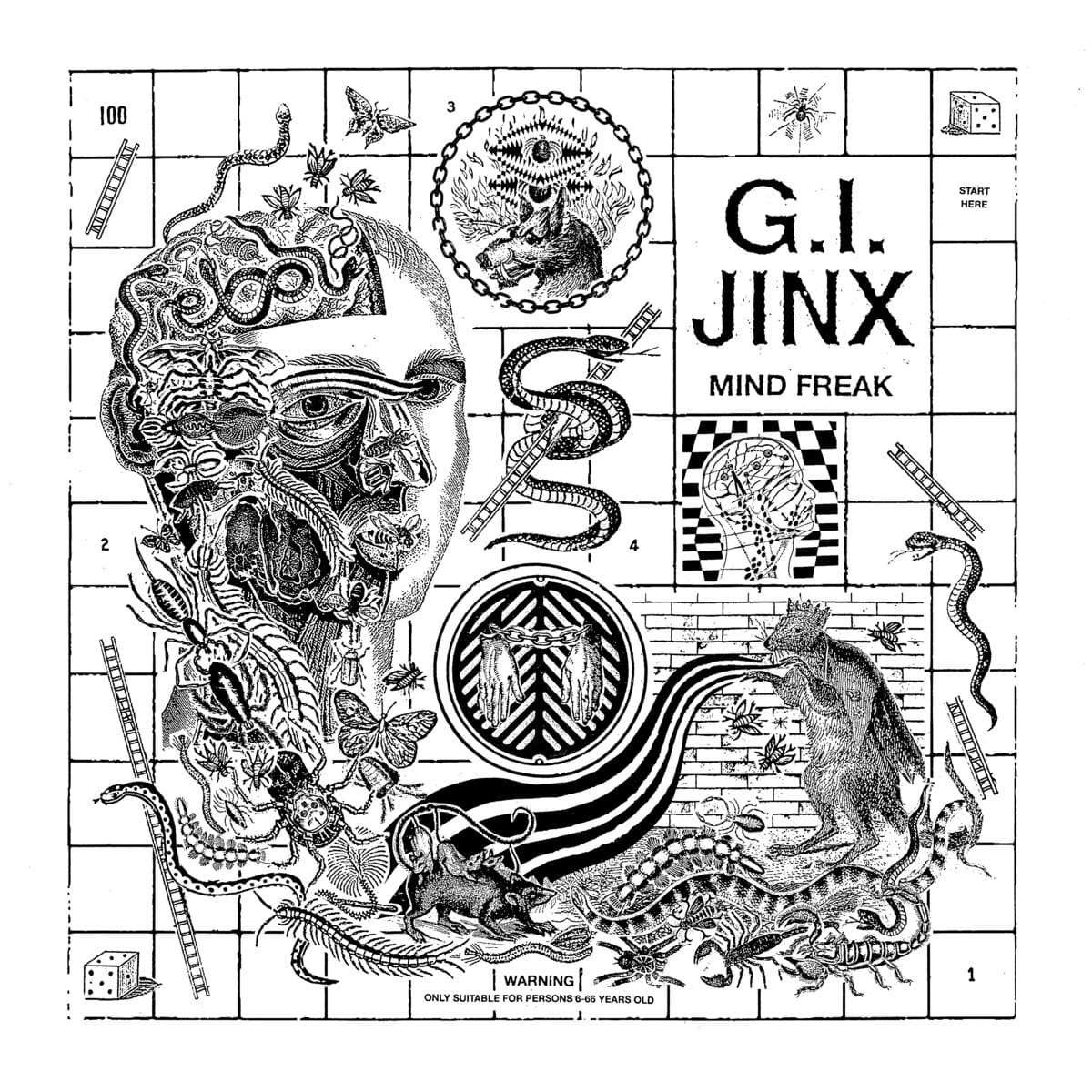
I’ve noticed more music fanzines lately and saw that WFMU is starting to publish their zine LCD again. I wondered if you noticed a similar desire for older, non-computer based ways to learn about music?
Steve: It feels like people are suspicious of the companies who control the accessibility to music. I really connected with the resurgence of tapes in the early-mid 2000s. Since then they’ve really solidified their place as a respectable form of media. People are even talking about CDs again! Personally, I don’t really use Spotify or other platforms to search out new bands or music. It’s more from directly talking to people.
Anna: Yeah, me too. Mostly from friends or bandmates recommending music to me or going to see a show and you’re only there for the headliner, but then the opening act actually ends up being sick or something like that.
That’s the best when that happens.
Anna: I don’t see a lot of zines and stuff, but I know that we’re going to be on some kind of compilation that a zine is going to be made for, so that’s cool.
Félix: Celluloid Lunch is also a paper zine. I have two issues.
You mentioned your release show, any other plans to promote the record?
Félix: Our release show is on June 7 at the Crumper in Montreal, and we have a couple of things in the bag, but I don't know if we're allowed to talk about them yet.
Anna: Well, we made a crazy mutant body horror music video to promote the record, we’re gonna play some shows, we also have another demo on a Celluloid Lunch compilation that will come out soon. We don’t have any crazy guerilla marketing tactics. Maybe we should. We talked about making G.I. Jinx toilet paper at some point.
Félix: Yeah, because Michael works at a company that makes merchandise for bands and we were asking him what was the craziest thing he’s ever done and he had a band wanting toilet paper.
Steve: Or urinal pucks.
Chris Landry plays in the Toronto band Zero Bars. His zine is called Rate of Decay.

